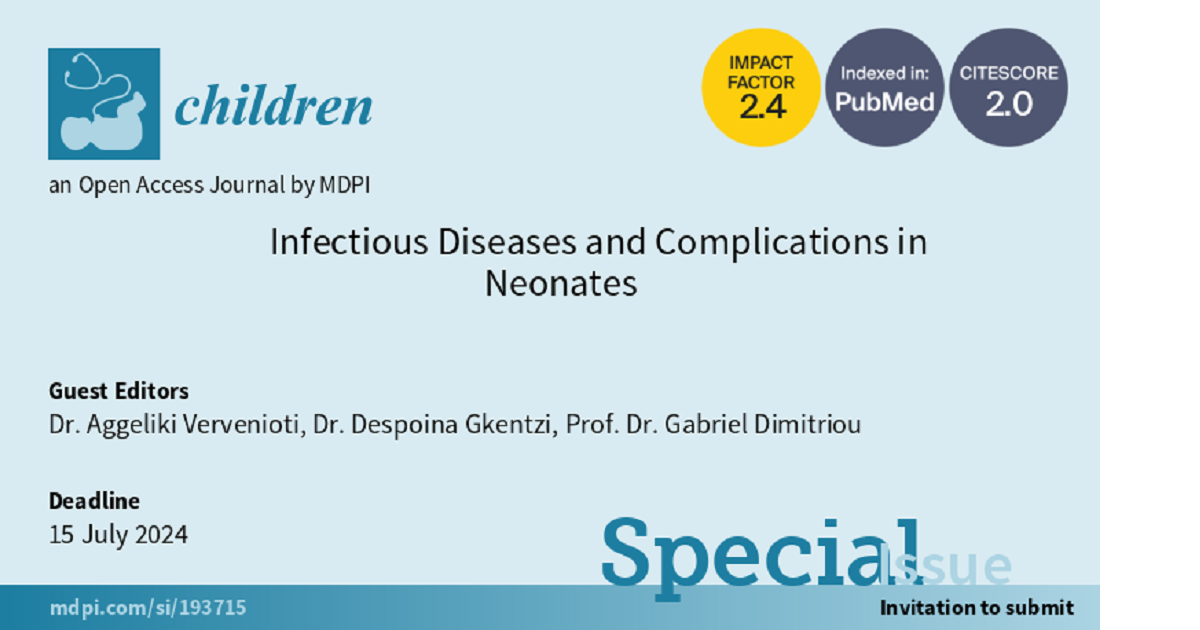- 2.1Impact Factor
- 3.8CiteScore
- 16 daysTime to First Decision
Infectious Diseases and Complications in Neonates
This special issue belongs to the section “Pediatric Infectious Diseases“.
Special Issue Information
Dear Colleagues,
Neonatal infections can present with non-specific symptoms and signs, which may also be due to non-infectious causes. Hence the empirical use of antimicrobials is a widely accepted practice in neonatology. However, the prolonged and occasionally unnecessary use of broad-spectrum antimicrobials in NICUs increases the risk of Candida colonization and invasive infection, necrotizing enterocolitis, late-onset neonatal sepsis and death. Recent data also suggest the development of long-term effects of the overuse of antimicrobials in neonates occurring via their intestinal microbiome damage, such as the development of atopy.
We are interested in original articles and reviews that describe an original research or therapeutic advances in all aspects of the allergies mentioned above.
We are looking forward to your contribution.
Dr. Aggeliki Vervenioti
Dr. Despoina Gkentzi
Prof. Dr. Gabriel Dimitriou
Guest Editors
Manuscript Submission Information
Manuscripts should be submitted online at www.mdpi.com by registering and logging in to this website. Once you are registered, click here to go to the submission form. Manuscripts can be submitted until the deadline. All submissions that pass pre-check are peer-reviewed. Accepted papers will be published continuously in the journal (as soon as accepted) and will be listed together on the special issue website. Research articles, review articles as well as short communications are invited. For planned papers, a title and short abstract (about 250 words) can be sent to the Editorial Office for assessment.
Submitted manuscripts should not have been published previously, nor be under consideration for publication elsewhere (except conference proceedings papers). All manuscripts are thoroughly refereed through a single-blind peer-review process. A guide for authors and other relevant information for submission of manuscripts is available on the Instructions for Authors page. Children is an international peer-reviewed open access monthly journal published by MDPI.
Please visit the Instructions for Authors page before submitting a manuscript. The Article Processing Charge (APC) for publication in this open access journal is 2400 CHF (Swiss Francs). Submitted papers should be well formatted and use good English. Authors may use MDPI's English editing service prior to publication or during author revisions.
Keywords
- pediatric
- infectious diseases
- diagnosis
- treatment
- prevention
- neonate
- complications

Benefits of Publishing in a Special Issue
- Ease of navigation: Grouping papers by topic helps scholars navigate broad scope journals more efficiently.
- Greater discoverability: Special Issues support the reach and impact of scientific research. Articles in Special Issues are more discoverable and cited more frequently.
- Expansion of research network: Special Issues facilitate connections among authors, fostering scientific collaborations.
- External promotion: Articles in Special Issues are often promoted through the journal's social media, increasing their visibility.
- e-Book format: Special Issues with more than 10 articles can be published as dedicated e-books, ensuring wide and rapid dissemination.

